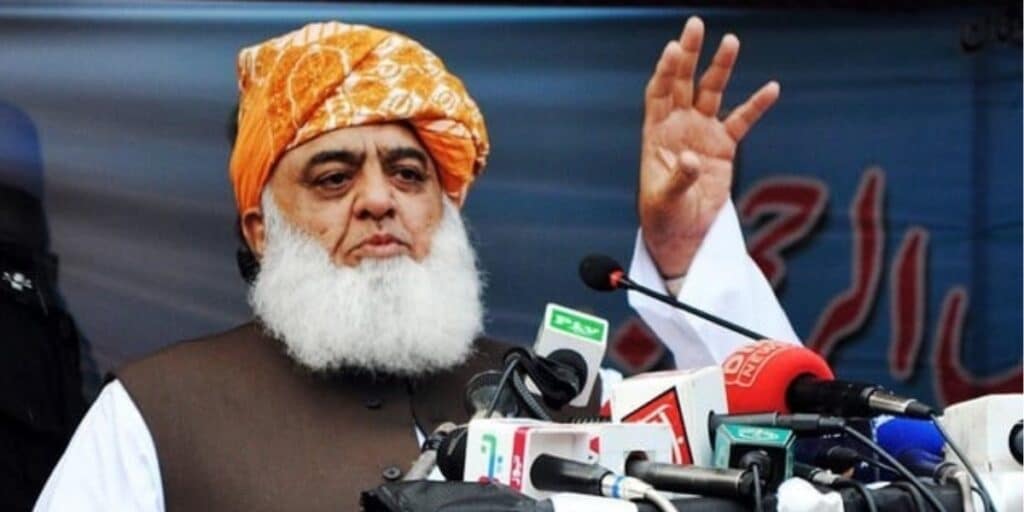ISLAMABAD: Maulana Fazlur Rehman Criticizes State’s Role in Security, Economy, and National Policies
Jamiat Ulema-e-Islam (F) chief Maulana Fazlur Rehman stated that the elimination of terrorism is a distant dream and regretted that the government’s authority is virtually non-existent in Balochistan and Khyber Pakhtunkhwa.
While addressing a leadership meeting and “National Consultation” organized by the Milli Yakjehti Council, he remarked that terrorists roam freely even during the day without fear, and the state should not shift the burden of its failures onto the public.
He questioned whether the ongoing unrest is a result of incompetence or a deliberate act by state institutions.
He emphasized the need for a bold stance and reiterated that armed struggle is unjustified.
Referring to the U.S. invasion of Afghanistan, he recalled that during that chaotic time, the Muttahida Majlis-e-Amal (MMA) was active and committed to the unity of the Muslim world, even enduring imprisonment for the cause.
Maulana stressed that using weapons for religious causes in Pakistan is un-Islamic and reiterated JUI-F’s long-standing position that armed struggle is forbidden.
He questioned the outcomes of operations from Swat to Waziristan, pointing out that displaced people remain homeless to this day and asked how those who fled to Afghanistan returned.
He highlighted that JUI-F forced the government to withdraw from 35 clauses of the 26th Amendment, reducing it to 22 points, and then took further steps.
Regarding the abolition of interest-based economy, he stated that December 31, 2027, is the final deadline, and it is now constitutionally bound that by January 1, 2028, interest must be fully eliminated.
He urged vigilance and warned that if the government defaults on this commitment, legal action will be necessary.
He added that if the matter is taken to court, it will be difficult for the government to argue against its own constitution.
Any appeal against the Federal Shariat Court’s verdict in the Supreme Court’s appellate bench would be automatically suspended, and following the constitutional amendment, the ruling will be implemented by January 2028.
He clarified that if an appeal arises, it must be resolved within a year, after which the decision becomes enforceable.
The Federal Shariat Court’s ruling, he said, will take immediate effect. Additionally, a judge of the Shariat Court can now be appointed as its Chief Justice.
The recommendations of the Islamic Ideological Council will now be debated in Parliament rather than merely presented.
Maulana questioned the obstacles in the way of lawful marriages while immoral relationships are facilitated.
He criticized the state of affairs where religiously permissible actions are made difficult while unethical acts are tolerated.
He condemned honor killings as un-Islamic and stated that legislation must reflect societal values, warning that ignoring these values leads to widespread criticism from all sides.
He criticized the weakening of Pakistan’s position on Kashmir, recalling how former President Musharraf proposed dividing the region into three parts.
As the former head of the Kashmir Committee, he said Pakistan’s gradual withdrawal from its strong stance on Kashmir was evident, noting that when Modi revoked Article 370, Pakistan couldn’t even mention it in its resolution.
He reiterated that the FATA merger was a mistake, saying it was part of an American agenda to bring geographic changes in the region.
Now even provincial authorities admit it was the wrong decision and are calling for commissions.
However, reversing the decision or forming a new province would require two-thirds majority in both federal and provincial assemblies.
Maulana condemned Israel’s illegal occupation of Palestine, calling the two-state solution a deception.
He said Israel is a usurper and shared Khaled Mashal’s statement that over 70,000 Palestinians have been martyred.
He recalled that Israel’s first president declared that destroying any new Muslim state would be a key foreign policy objective.
He praised Pakistan’s early support for the Palestinian cause, dating back to 1940, and said both the Haramain and Al-Aqsa Mosque are sacred to Muslims but are currently under Jewish control.
He cited these atrocities as the fulfillment of the Prophet Muhammad’s prophecy.
He welcomed Iran’s recent response to Israel’s aggression and condemned Israel’s attacks on Iran.
ALSO READ: Religious leaders denounce honour killings in Balochistan
He praised Iran’s unwavering support for Pakistan during wars with India and affirmed that JUI-F will stand united for the protection of the Haramain.





